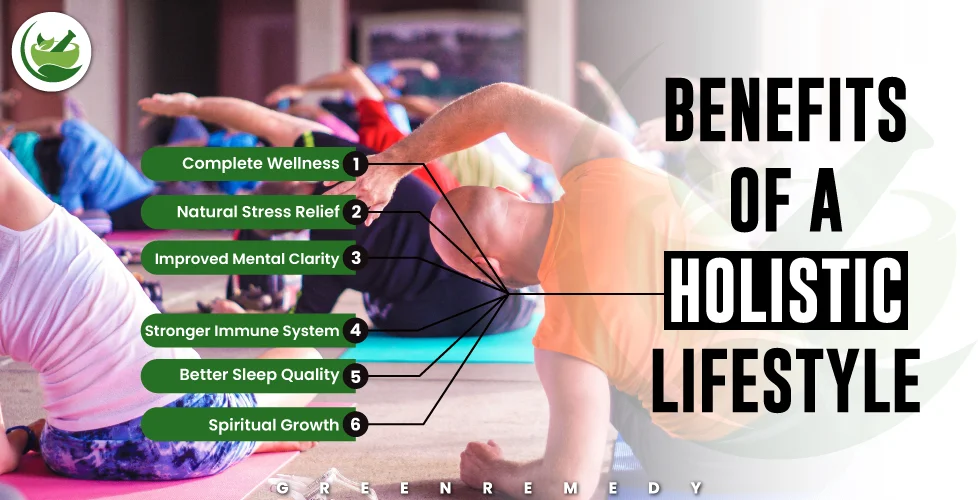
In today’s fast-paced, hyper-connected world, stress and mental fog have become almost unavoidable. We’re constantly bombarded by emails, notifications, responsibilities, and societal expectations. Amid all this chaos, a growing number of people are turning toward a more balanced, integrated approach to well-being the holistic lifestyle. Rooted in ancient traditions but increasingly relevant in the modern age, the benefits of holistic lifestyle go far beyond just physical health. When practiced mindfully, a holistic way of living can lead to significant stress relief and enhanced mental clarity. In this in-depth guide, we’ll explore what a holistic lifestyle truly entails, how it works, and exactly how it can help you overcome stress, sharpen your mind, and live with more intention and peace.
Read More: A guide to holistic living
What is a Holistic Lifestyle?
Before diving into the benefits, it’s important to understand what a holistic lifestyle actually entails. A holistic lifestyle is a way of living that emphasizes the whole person: body, mind, emotions, and spirit. It involves making conscious choices that promote wellness in every area of your life physical health, mental well-being, emotional balance, spiritual growth, and social connection.
Some key elements of a holistic lifestyle include:
- Nutrition and whole foods
- Physical movement and exercise
- Mindfulness practices like meditation and yoga
- Natural and alternative therapies
- Positive relationships and community
- Spiritual practices and self-awareness
- Eco-conscious living and connection to nature
By adopting this lifestyle, people aim to nurture balance, inner peace, and lasting vitality, rather than just masking symptoms or chasing quick fixes.
Why the Holistic Lifestyle is More Important Than Ever
In the post-pandemic world, where burnout, anxiety, and mental health challenges are at an all-time high, the benefits of holistic lifestyle are not just nice to have — they are essential. People are realizing that true health isn’t found in a pill or a diet trend. It’s a lifelong journey of tuning into your body, nurturing your mind, honoring your emotions, and connecting with your spirit. And it’s this integration that brings lasting stress relief, clarity, vitality, and peace.
Why Are We So Stressed?

Before we explore the benefits of holistic lifestyle in reducing stress and improving mental clarity, let’s look at why stress is so pervasive:
- Digital overload: Constant screens, social media, and emails bombard our attention.
- Poor diets: Highly processed, nutrient-deficient foods affect mental health.
- Lack of movement: Sedentary jobs contribute to anxiety and restlessness.
- Sleep deprivation: Irregular sleep schedules lead to brain fog and irritability.
- Disconnectedness: We’ve lost touch with nature, community, and often ourselves.
In short, modern life is imbalanced, and that’s exactly where the holistic lifestyle shines — by restoring that balance and offering relief through multiple interconnected strategies.
Read More: Mushrooms and herbs for stress relief
What Does “Holistic” Mean in Treatment?
The word holistic comes from the Greek word holos, meaning “whole.” In healthcare, it means viewing the individual as a complete system where mental, emotional, physical, and spiritual Benefits of Holistic Lifestyle health are interconnected. Holistic modalities aim to identify and treat root causes, not just the symptoms.
Common Holistic Treatment Modalities
Here’s a breakdown of some widely practiced holistic treatment methods:
1. Mind-Body Practices
These methods emphasize the powerful connection between mental and physical health.
- Meditation & Mindfulness: Calms the nervous system, reduces stress, and promotes self-awareness.
- Yoga: Combines physical postures, breathwork, and meditation for balance and well-being.
- Tai Chi/Qigong: Gentle movement-based practices rooted in traditional Chinese medicine.
- Biofeedback: Teaches control over physiological functions like heart rate or muscle tension through feedback devices.
2. Nutritional Therapy
Food is seen as medicine in many holistic systems.
- Whole Foods Nutrition: Emphasizes organic, unprocessed foods tailored to individual needs.
- Herbalism: Uses plants and natural substances to support healing.
- Functional Nutrition: Focuses on using nutrition to address underlying health imbalances (e.g., inflammation, gut health).
3. Energy Healing
These methods involve balancing or enhancing the body’s energy flow.
- Reiki: A Japanese technique where practitioners channel healing energy through gentle touch or hovering hands.
- Acupuncture: Involves inserting fine needles into specific energy points to restore balance (a pillar of Traditional Chinese Medicine).
- Chakra Healing: Based on the concept of energy centers (chakras) in the body that influence well-being.
4. Body-Based Therapies
Touch and physical manipulation are used to treat both physical and emotional stress.
- Massage Therapy: Relieves muscle tension, improves circulation, and promotes relaxation.
- Chiropractic Care: Focuses on spinal adjustments to optimize nervous system function.
- Craniosacral Therapy: Gentle manipulation of the skull and spine to release blockages in the central nervous system.
5. Spiritual and Psychological Modalities
These therapies help foster emotional healing and spiritual growth.
- Talk Therapy with a Holistic Focus: Includes approaches like transpersonal psychology or spiritual counseling.
- Hypnotherapy: Uses guided hypnosis to uncover root issues or shift subconscious patterns.
- Sound Healing: Uses sound frequencies (like singing bowls, gongs, or tuning forks) to induce deep relaxation and healing.
- Art and Music Therapy: Helps individuals process emotions and trauma through creative expression.
6. Detoxification and Lifestyle Therapies
These address environmental and lifestyle factors contributing to disease.
- Detox Programs: Natural detoxification using diet, fasting, herbs, or cleansing protocols.
- Aromatherapy: Use of essential oils to influence mood, stress, and energy levels.
- Sleep Optimization: Establishing healthy sleep routines for body and brain restoration.
7. Build a supportive community
- Build a supportive community to enhance emotional well-being.
- Surround yourself with positive, like-minded individuals who inspire and motivate you.
- Engage in meaningful conversations that nurture your mental and emotional health.
Types of Holistic Medicine

Holistic medicine encompasses a wide range of healing practices that focus on treating the whole person mind, body, and spirit. These approaches integrate traditional wisdom with modern knowledge to support long-term health and well-being. Below are some of the most recognized types of holistic medicine:
1. Traditional Chinese Medicine (TCM)
- Based on the concept of balancing energy (Qi) within the body.
- Includes acupuncture, herbal medicine, cupping, tai chi, and diet therapy.
- Focuses on restoring harmony between the body’s internal systems and the environment.
2. Ayurvedic Medicine
- Originated in India over 5,000 years ago.
- Uses a combination of herbs, massage, diet, yoga, and detox therapies to balance the body’s energies (Vata, Pitta, Kapha).
- Emphasizes individualized care and preventative wellness.
3. Naturopathic Medicine
- Combines natural remedies with modern science.
- Practitioners use nutrition, herbal medicine, detoxification, homeopathy, and lifestyle counseling.
- Focuses on treating root causes and empowering self-healing.
Read More: Chia Water Benefits for Heart Health: Supporting Cardiovascular Wellness
How Holistic Modalities Support Whole-Person Wellness
Holistic modalities are grounded in the principle that true health encompasses the integration of mind, body, and spirit. Rather than treating isolated symptoms, these approaches focus on identifying and addressing the root causes of imbalance. By combining natural therapies, lifestyle adjustments, and mindful practices, holistic treatments support the body’s innate ability to heal and self-regulate. This whole-person approach promotes not only physical well-being, but also emotional stability, mental clarity, and spiritual alignment—resulting in a more balanced, resilient, and sustainable state of wellness.
Benefits of a Holistic Lifestyle

- Complete Wellness – Focuses on mind, body, and spirit, promoting overall well-being instead of just treating symptoms.
- Natural Stress Relief – Uses tools like mindfulness, meditation, and herbal remedies to reduce anxiety and manage stress naturally.
- Improved Mental Clarity – Supports brain health through clean eating, digital detoxing, and emotional balance.
- Stronger Immune System – Encourages nutrition, sleep, and movement routines that enhance natural immunity.
- Better Sleep Quality – Incorporates calming rituals and natural therapies to improve sleep cycles.
- Emotional Balance – Helps process emotions through self-reflection, therapy, journaling, and energy healing.
- Enhanced Energy Levels – Promotes clean food, proper hydration, and restorative movement to reduce fatigue.
- Spiritual Growth – Fosters a deeper connection with self, nature, and purpose through practices like meditation and prayer.
- Healthier Relationships – Encourages empathy, conscious communication, and emotional awareness in relationships.
- Disease Prevention – Emphasizes prevention through lifestyle changes and early intervention, not just treatment.
- Sustainable Living – Aligns personal health with environmental consciousness by reducing toxins and waste.
- Self-Empowerment – Encourages individuals to take responsibility for their own health and make informed, intentional choices.
- Long-Term Wellness – Builds a foundation for lifelong physical, mental, and emotional health.
Read More: Health Benefits of Eating Oats and Oatmeal: A Nutritional Boost
How to Find a Therapist
Finding the right therapist is a crucial step in supporting your mental and emotional well-being. Whether you’re dealing with stress, anxiety, trauma, or simply want personal growth, choosing the right professional can make all the difference. Here’s how to approach the process with clarity and confidence:
1. Identify Your Needs and Goals
- Ask yourself: Why do I want therapy?
- Common reasons include: anxiety, depression, relationship issues, trauma, grief, or personal development.
- Determine whether you prefer individual, couples, family, or group therapy.
2. Understand Different Types of Therapists
Therapists may hold various titles, depending on their training and credentials:
- Psychologist (PhD or PsyD) – Specialized in mental health diagnosis and psychotherapy.
- Licensed Clinical Social Worker (LCSW) – Provides therapy and support for emotional/behavioral challenges.
- Licensed Professional Counselor (LPC) – Trained in talk therapy for various emotional issues.
- Psychiatrist (MD) – Medical doctor who can prescribe medications and may offer therapy.
- Marriage and Family Therapist (MFT) – Focuses on relationship and family dynamics.
3. Choose the Right Therapy Approach
Each therapist may use different modalities. Some common approaches include:
- Cognitive Behavioral Therapy (CBT) – Focuses on changing negative thought patterns.
- Psychodynamic Therapy – Explores unconscious thoughts and childhood experiences.
- Holistic or Integrative Therapy – Combines talk therapy with mindfulness, nutrition, energy work, etc.
- Trauma-Informed Therapy (e.g., EMDR) – For those with past trauma or PTSD.
FAQs
Frequently Asked Questions: Your Guide to Embracing a Holistic Lifestyle with Confidence and Clarity.
1. What are the benefits of holistic living?
Holistic living improves mental clarity, boosts physical health, reduces stress, and enhances overall life balance.
2. What are the positives of holistic care?
It treats the root cause of issues, promotes natural healing, and supports long-term well-being across mind, body, and soul.
3. What is a holistic lifestyle?
A holistic lifestyle is a way of living that nurtures physical, mental, emotional, and spiritual health in harmony.
4. What is the importance of a holistic approach?
A holistic approach ensures balanced well-being by addressing all aspects of life, not just isolated symptoms or problems.
5. What is the result of holistic living?
The result is a more balanced, energized, and purposeful life with improved health and deeper self-awareness.
Final Thoughts
Adopting a holistic lifestyle is a strategic approach to achieving long-term well-being by addressing the interconnected needs of the mind, body, and soul. It fosters balance, resilience, and purpose, enabling individuals to function at their highest potential. By integrating holistic principles into daily life, one can experience sustainable health improvements, enhanced clarity, and a more meaningful connection to self and surroundings.
